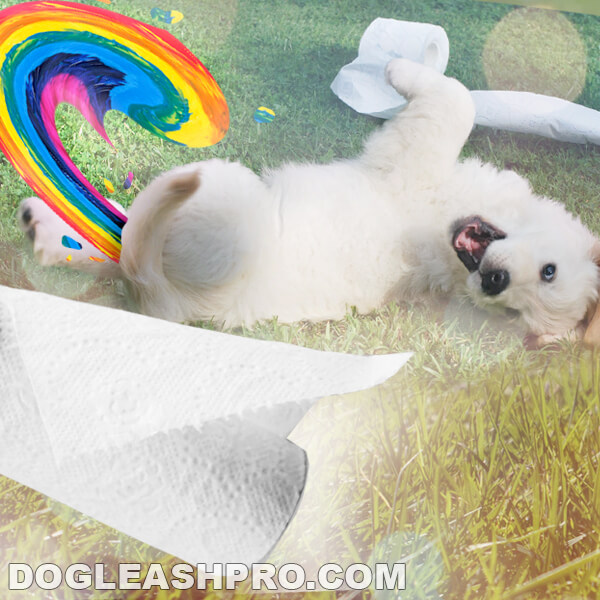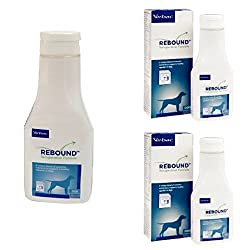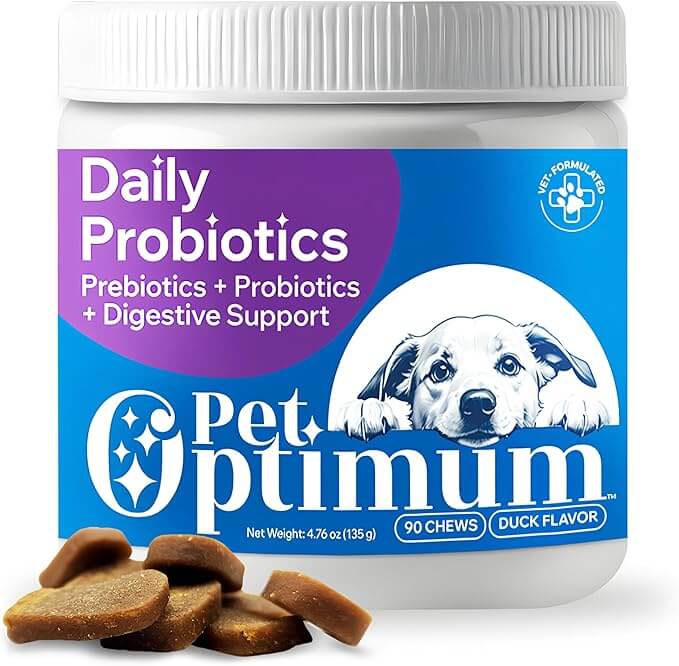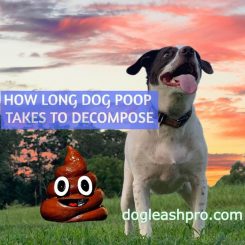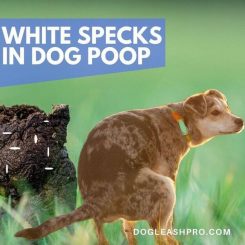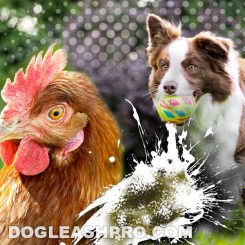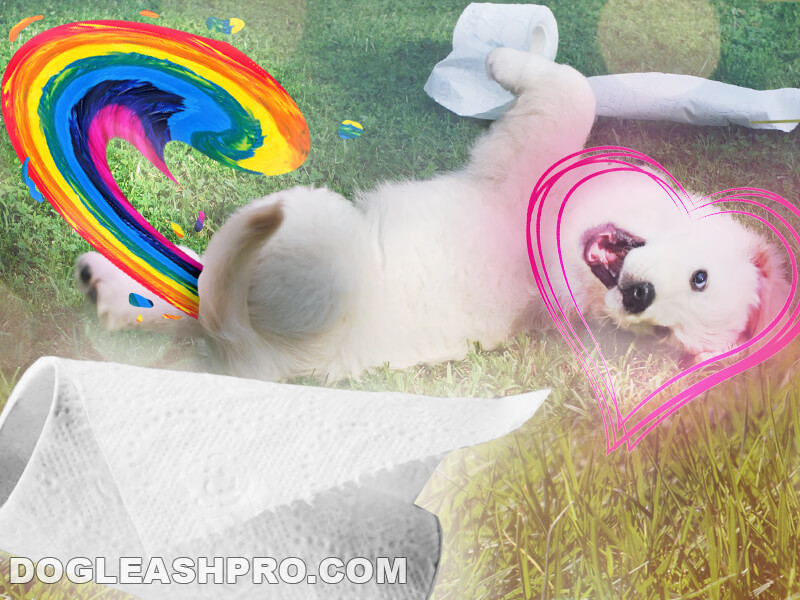
Many pet owners may find it confusing and concerning to see their puppies having diarrhea but are still playful, acting normal, and eating regularly. When a puppy has diarrhea but is still playful, there can be a number of reasons that cause this.
Diarrhea in puppies can range from mild to severe. Luckily, the appearance of the stool can tell you a lot. When your puppy has diarrhea, it is usually accompanied by other symptoms like vomiting, lethargy, and weakness.
In this comprehensive guide, we will discuss everything you need to know about what is causing diarrhea in puppies and what you can do to help so that your puppy is back to normal and having regular consistent poop.
Table of Contents
Puppy Has Diarrhea But Still Playful: Here’s what you need to know
Puppies will be puppies and they are naturally curious creatures. They love to explore their surroundings and understand their environment through their senses, primarily using their noses, mouths, and paws to learn about the world around them.
Therefore, it’s not surprising if you find your precious puppy playing in your backyard or at the dog park and licking something they see.
Some puppies may even chew on something they see, even if that thing is rotten or foul-smelling.
There’s nothing wrong with this as this is how they learn. However, this can result in your puppy getting sick or having diarrhea.
Fortunately, in most cases, your puppy’s diarrhea doesn’t last that long.
So, how long is too long for a puppy to have diarrhea?
If he has had diarrhea for more than one or two days and none of your at-home remedies are helping to improve, we highly recommend that you bring him to the vet.
It is important to note that diarrhea isn’t a disease but a symptom of another illness. A severe medical condition would cause your puppy to show other signs along with watery poop such as the following:
- Vomiting.
- Loss of appetite.
- Bloody diarrhea.
- Lethargy.
- Having trouble pooping.
But if your pup has the runs and looks otherwise normal, they may just be having a mild stomach upset.
Mild diarrhea is relatively common among pups and can be treated at home. However, underestimating puppy diarrhea can be a grave mistake. Suffice to say, when it comes to puppies, things can escalate quickly.
Why does my puppy have diarrhea but acting normal?
If your puppy has diarrhea but is otherwise acting normal, it could be due to various reasons. Some of the common causes include:
- Dietary changes: A sudden change in diet or eating something unusual can cause temporary diarrhea in puppies.
- Ingestion of foreign objects: Puppies are curious and might ingest something they shouldn’t, which can cause diarrhea.
- Stress: Our puppies can experience stress in different situations, such as moving to a new home or being left alone, which can sometimes result in diarrhea.
- Parasites: Parasites like giardia, coccidia, or intestinal worms can cause diarrhea in dogs.
- Viral or bacterial infections: Infections like parvovirus, coronavirus, or bacterial infections can cause diarrhea.
- Food intolerance: Some dogs may be intolerant to certain ingredients, such as lactose or specific proteins.
- Overeating
Even though your puppy is acting normal, monitoring their symptoms and ensuring they stay hydrated is essential.
If the diarrhea persists for more than 24-48 hours or is accompanied by other concerning symptoms such as vomiting, lethargy, or loss of appetite, then it’s crucial to consult a veterinarian for a proper diagnosis and treatment plan.
Next, let’s explore each of the above reasons in more detail.
What are the common causes of diarrhea in puppies?
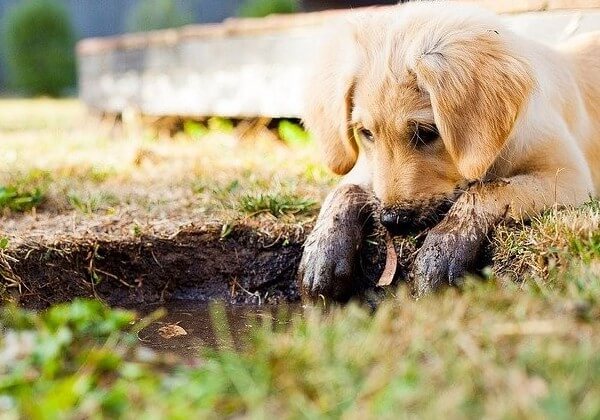
Diarrhea can scare many puppy owners as it sometimes indicates a severe ailment. The reasons range from mild indigestion to lethal viruses. New puppy owners should familiarize themselves with the typical causes behind their pup’s runny poop. Here are seven common causes of diarrhea in puppies:
1. Stress
Stress and anxiety often cause puppies to have trouble with their bowels. An unfamiliar environment, a different home, separation from mother, change in diet, and a new routine can all be stressful on your fur baby.
Give them time and affection to settle in their new environment and make them accustomed to the sights and sounds of their new home.
2. Eating junk
Puppies don’t have the best judgment when it comes to putting stuff in their mouths, and this often leads to them ingesting things they’re not supposed to.
Plastic toys, food or candy wrappers, garbage, and toxic foods like certain plants can all cause loose stools in your pup. Some of these can cause blockage in your puppy’s tummy and would require veterinary assistance to clear. Some toxic foods may also lead to other problems and would need immediate medical help.
3. New food
Your baby pooch may take a while to get used to new and unfamiliar food. A sudden change in diet can shock your pup’s digestive system and lead to issues like indigestion and diarrhea.
Always introduce new food in small quantities while checking your puppy’s response. If there’s no abnormal reaction, you may increase its proportion gradually.
4. Overeating
Overeating can cause diarrhea in puppies because their digestive systems are still developing, and they may be unable to process large amounts of food efficiently.
When a puppy consumes more food than his body can handle, it can lead to incomplete digestion, causing the undigested food to pass through the intestines more rapidly.
This can result in diarrhea as the body tries to expel the excess food.
Additionally, overeating can lead to an imbalance of gut bacteria. The excess food can cause an overgrowth of harmful bacteria, leading to inflammation and irritation of the gastrointestinal tract, further contributing to diarrhea.
To prevent over-eating, providing them with the appropriate amount of food is crucial based on their age, weight, and activity level.
Remember that every dog is different, and their nutritional needs may vary. You should always consult your veterinarian for specific recommendations tailored to your puppy.
As a general guideline, here’s a rough estimate of how much food puppies may need each day based on their age and size:
6-12 weeks old:
- Small breeds: 1/2 to 1 cup of food, divided into 3-4 meals per day
- Medium breeds: 1 to 2 cups of food, divided into 3-4 meals per day
- Large breeds: 2 to 4 cups of food, divided into 3-4 meals per day
3-6 months old:
- Small breeds: 1/2 to 1 cup of food, divided into 3 meals per day
- Medium breeds: 1 to 2 cups of food, divided into 3 meals per day
- Large breeds: 2 to 4 cups of food, divided into 3 meals per day
6-12 months old:
- Small breeds: 1/2 to 1 cup of food, divided into 2 meals per day
- Medium breeds: 1 to 2 cups of food, divided into 2 meals per day
- Large breeds: 2 to 4 cups of food, divided into 2 meals per day
These are just general guidelines, and the actual amount of food your puppy needs may vary.
Monitoring your puppy’s weight and body condition and adjusting his food intake are essential.
If you need help determining how much food to serve your precious pup, we recommend following the feeding recommendations provided by your veterinarian and the dog food manufacturer.
5. Food allergies
Some harmless foods can cause your puppy to react unexpectedly. It happens when your little fur buddy is allergic to that food. Vomiting and diarrhea are typical symptoms of food allergies.
Always be careful when feeding known allergens to your pups. It’s best to avoid feeding them food they are allergic to. When trying a new diet, start with a small amount and watch for any adverse reaction.
6. Parasites
Puppies are easy targets for parasites like Roundworms, Coccidia, Whipworms, Hookworms, and Giardia. Some of these parasites might even transfer from the mother to the newborn pup.
Aside from causing diarrhea, parasites also cause bloody stool, lethargy, and weakness. If you see these symptoms in your fur baby, get a sample of their poop checked by a vet.
Medications can eliminate parasites, but their eggs are much harder to destroy. Failure to maintain cleanliness around the house may lead your pup to contract these nasties again.
7. Bacterial infection
The underdeveloped immune systems of puppies leave them vulnerable to nasty bacterial infections. E.coli, Salmonella, and Clostridium are potentially fatal bacteria that your pup can catch from contaminated food or water.
Some puppies are curious and during their walk, they may sniff and come across other puppies’ poop. When I was young, my family brought home a German Shepherd puppy. Within a few weeks, we were shocked to learn that he had an urge to eat other puppy’s feces and this is actually known as coprophagia. Eating other puppy’s poop can lead to bacterial infection as well.
Runny poop accompanied by fever and vomiting is a telltale sign of a bacterial infection. Please consult with your vet who will most likely prescribe antibiotics that can help with the bacterial infection.
8. Viruses
Viruses like canine coronavirus, distemper, and parvovirus are often accompanied by diarrhea. Antibiotics can cure bacterial infections, but viruses have no cure. Vaccination can strengthen the immune system enough to resist these nasty diseases.
Unfortunately, puppies can contract viruses before their vaccination is complete, so pup parents should be extra vigilant during their fur baby’s early days.
What is the difference between mild and severe diarrhea in puppies?
The texture of your puppy’s diarrhea can determine its severity. A soft stool or a pudding-like liquid poop indicates mild diarrhea, whereas watery squirts suggest severe diarrhea.
Puppies have tiny bodies that can run out of water quickly. Even if your pup has mild diarrhea, waste no time in calling for veterinary help. Puppies suffering from severe diarrhea can die from dehydration.
Puppy Has Diarrhea But Still Playful: What should you do?
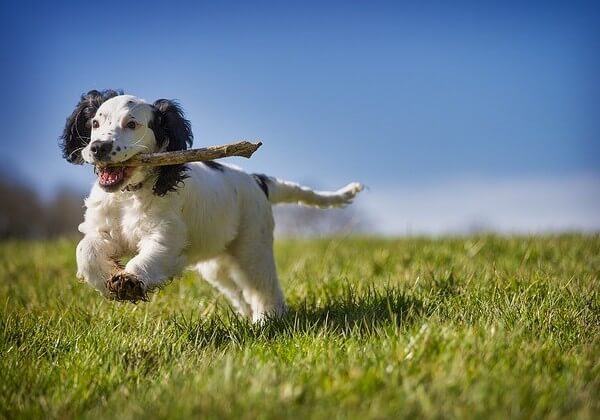
The cause of your puppy’s loose stools may be something completely harmless, like stress or food sensitivity; or it can be a life-threatening illness, like a viral or bacterial infection. While a vet can best determine the reason, certain things can give you an idea of your puppy’s condition. Here’s what you should consider.
Frequency of diarrhea in puppies
Puppies need to poop as many times as they eat. If your pup is going more often than it eats, he may have an early onset of diarrhea.
Appearance of Stool
The clearest indicator that something is wrong in your puppy’s gut is the poop’s appearance—namely, the color and texture.
A healthy puppy’s poop should be the color of milk chocolate and should be able to hold its shape. Any deviation from that should be a cause for concern. You should also look for any foreign objects in the poop. If your puppy has diarrhea, be sure to take a look right away as dog poop decomposes after some time.
Additional Health Symptoms
Diarrhea is a symptom of another disease. Accompanying health symptoms can help you determine the root cause of your puppy’s runs.
If you observe fever, vomiting, weakness, lethargy, or pale gums, their diarrhea may be more than just stress or diet allergy.
Puppy Has Diarrhea But Still Playful: What can you do at home?
As soon as you notice your pup going potty more often than usual, you should be on high alert. Observe the poop’s color and consistency as best as you can. Check for other symptoms like lethargy, high temperature, and signs of pain.
No matter how mild the symptoms look, it’s best to get your vet’s opinion. A simple call detailing your puppy’s condition will let the vet give you the best course of action.
Try collecting a sample of the pup’s poop and take it to the vet. That will enable the vet to diagnose the underlying cause more accurately.
If your vet deems hospitalization unnecessary, you can start treating your pup at home.
Many dog owners suggest that puppies suffering from diarrhea should be fasted for at least 12 hours to give their digestive system a rest.
While it is an effective treatment for adult dogs, it’s not recommended for puppies. Instead, here are eight better ways to get rid of diarrhea in puppies.
How to get rid of Diarrhea in puppies?
1. A bland diet
While resting the digestive system is necessary, fasting is not an option for puppies. Instead, a light diet of plain boiled white rice is a much better option. Cook the rice with white chicken meat to make it more palatable, but don’t feed your pup the chicken until the next day.
The food must not carry any fats or spices. If cooking isn’t an option, ready-made food formula or nutritional supplement makes an excellent alternative.
Handy Hint: For more information on Ensure, check out Can Dogs Drink Ensure?
2. Hydration
Dehydration is a lethal side effect of diarrhea. Pups don’t have much water in their bodies, and continuous bouts of diarrhea can sap them of water and electrolytes. Give them plenty of water to recover what they lose while pooping.
If your pup isn’t interested in drinking, give them an electrolyte solution, or freeze the water in cubes for them to lick.
You may be interested in: How Long Can A Puppy Go Without Eating or Drinking?
3. Probiotics
Probiotics are the good kind of bacteria that keep the bad bacteria from disturbing your pup’s gastrointestinal system. For a healthy puppy, the good bacteria must always be in balance with the bad ones.
Yogurt or Yakult is a safe and healthy source of probiotics for an ailing puppy. Add a tablespoon of it to your puppy’s food to help raise the number of good bacteria in their tummy.
For a more powerful and consistent solution, try PetOptimum Probiotics for Dogs. These vet-formulated chews are packed with live cultures to help maintain that all-important balance, keeping your puppy’s tummy happy and their energy high.
4. Prebiotics
Prebiotics supports the good bacteria in the pup’s body. If probiotics are an army of good bacteria, prebiotic foods strengthen and nurture that army. While many natural foods have prebiotic properties, puppies with gastrointestinal distress are recommended special fibers or husks by vets.
5. Smaller food portions
Instead of feeding a single heavy meal, decrease the load on your pup’s tummy by breaking the meal into smaller portions. This way, the food will nourish your fur baby and help him recover from diarrhea without putting an additional load on his digestive system.
6. Medicines
Medicines can comfort a pup with diarrhea in several ways. Your vet may prescribe drugs to help slow down the bowels, introduce good bacteria, prevent dehydration, stop vomiting, remove worms, recover energy, and cure the underlying cause of diarrhea.
Always consult your vet before administering any medication on a young pup.
7. Fibrous foods
Fibrous and binding foods can help the poop regain its consistency and become more solid. Sweet potato, pumpkin, Brussel sprouts, and special food supplements contain the right amount of fiber and binding properties that reduce fluid loss and make poop normal.
8. Time between meals
Giving the puppy’s tummy time to relax and recover is crucial. As starving is not an option for pups, extending the time between meals is the best option. This interval ensures the puppy gets the necessary sustenance while his belly gets adequate time to recover.
Puppy Has Diarrhea But Still Playful: When to call the Vet
Even if your puppy with diarrhea looks otherwise ok, you shouldn’t wait too long before calling the vet. Although mild episodes of diarrhea are treatable at home, a call to the vet will give you the best course of action. Puppies are fragile creatures, and even mild diarrhea must be treated with caution.
If you suspect a disease and don’t have any proof, you may take a sample of diarrhea to the vet. A vet can check for the presence of parasites and worms by testing a poop sample. After the diagnosis, the vet would prescribe if your pet needs home treatment or hospital admission.
There are some dire cases in which you’d have to take your pup to the vet. These cases involve visual indications of severe underlying diseases. Waste no time going to the vet if your puppy’s diarrhea accompanies the following:
- Blood.
- Black or dark-colored poop.
- Frequent vomiting.
- Loss of appetite.
- Dehydration.
- Pale gums.
- Liquid, squirting poop.
- Diarrhea lasting longer than a day.
- Fever (body temperature above 102°F).
- Visible pain.
- Signs that the pup has eaten something toxic.
- The vet suggests a visit.
How to prevent diarrhea in puppies
Fortunately, most cases of puppy diarrhea are mild and warrant nothing more than a bit of rest. But sometimes, diarrhea accompanies a much severe disease and requires hospitalization. Puppies are tiny and delicate beings, and their little bodies can deteriorate quickly after a few spells of diarrhea. So here are five ways to prevent diarrhea in your puppy:
1. Ease into new routine and foods
Stress from a sudden change in routine or a new diet can mess with your pup’s digestion. Treat your puppy with love and care and keep their schedule regular when they arrive at your house.
When introducing a new diet, start with a small amount and increase the proportion bit-by-bit instead of making an abrupt switch.
2. Control what they eat
Puppies don’t know what’s good for them, and it’s your responsibility to feed them a clean, pup-friendly diet. Keep garbage out of your pup’s reach and only buy toys that your little buddy can’t swallow. Avoid human foods altogether; this includes table scraps and snacks.
3. Keep toxic plants away
Plants don’t like being eaten, and many of the plants carry poisonous chemicals to deter animals. If your pup happens to munch on such a plant by mistake, they’ll experience stomach troubles and diarrhea. Avoid keeping toxic plants in your house, and don’t let your pup go near any poisonous bushes.
4. Vaccinate on schedule
A pup’s natural immune system isn’t strong enough yet to combat some nasty infections on its own, which is why vaccination is so important. Viruses don’t have a cure, and treatment relies on the strength of the immune system.
Always make sure to follow your pup’s vaccination schedule. Proper and timely vaccination will protect the puppy from foul diseases all throughout his life.
5. Minimize transfer of diseases
Young pups are at a bigger risk of picking up infections as they aren’t fully vaccinated. Pup owners should be extra vigilant with these young and fragile creatures. Keeping their living quarters, dishes, and toys clean and sanitized will stop bacteria from flourishing.
To prevent the transfer of viruses, don’t let your unvaccinated or partially vaccinated pup mix with unvaccinated dogs.
Related Questions
Even if your puppy is fine, diarrhea lasting longer than a day is dangerous, and you should seek immediate veterinary help as prolonged diarrhea can dehydrate a pup.
While runny poop is more frequent among puppies, it isn’t normal. If your pup excretes liquid poop multiple times a day, it’s best to call a vet.
No, puppies need sustenance to recover from diarrhea, and it’s better to feed them a soft and light diet rather than starving them. Do not stop feeding your pup unless the vet says so.
Yes, it’s possible for puppies to have diarrhea and not be sick. Diarrhea can sometimes be a temporary and mild issue that resolves on its own depending on the circumstances.
Some common causes of diarrhea that may not indicate a severe illness include changes in diet, new food, overeating, food allergies or intolerance, stress, and viral or bacterial infection. If you notice that your puppies have diarrhea, be sure to monitor them closely for the next 24 to 48 hours. If the diarrhea persists, contact your vet right away.
DISCLAIMER: THIS WEBSITE DOES NOT PROVIDE MEDICAL ADVICE
The information, including but not limited to, text, graphics, images and other material contained on this website are for informational purposes only. No material on this site is intended to be a substitute for professional veterinary advice, diagnosis, or treatment. Always seek the advice of your veterinarian or other qualified health care provider with any questions you may have regarding a medical condition.
Resources:
https://www.akc.org/expert-advice/health/puppy-feeding-fundamentals/
https://www.metrovetchicago.com/services/dogs/parasites/deworming-dogs

With over five years of specialized experience as an animal writer, my expertise lies in dog nutrition, health, behavior, grooming, and training. I am dedicated to delivering helpful and informative content that caters to the well-being of our furry friends. My primary goal is to empower pet owners with knowledge and ensure our canine companions thrive in health and happiness. In my free time, I love volunteering at local dog rescue centers.
